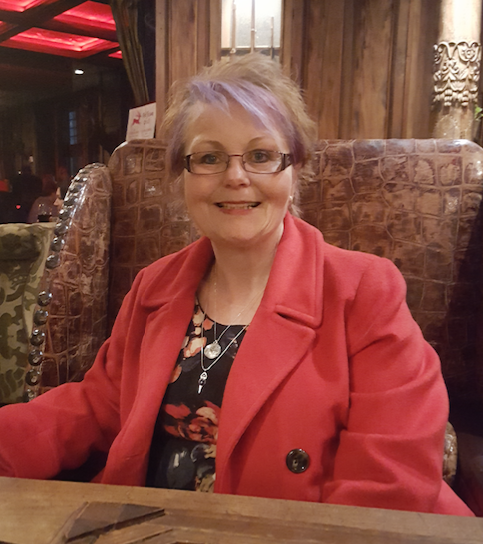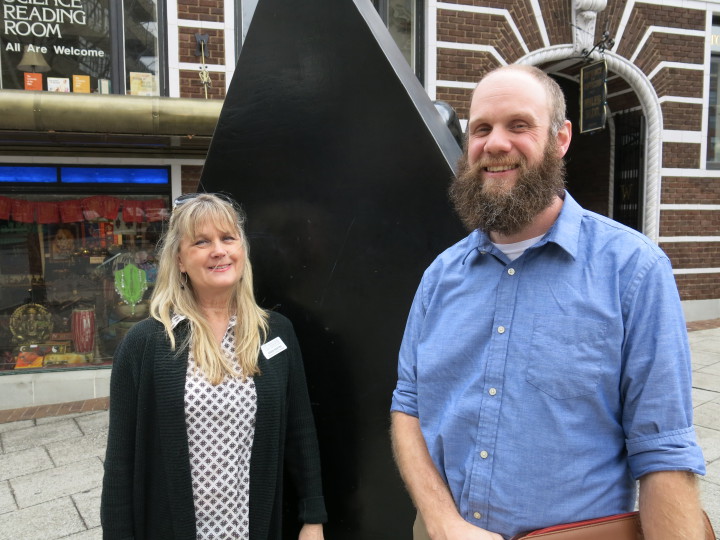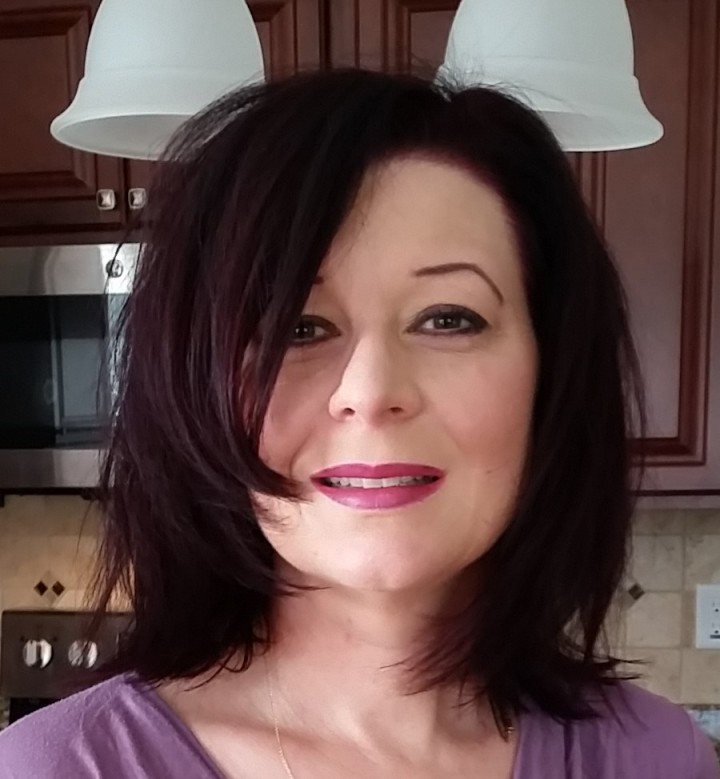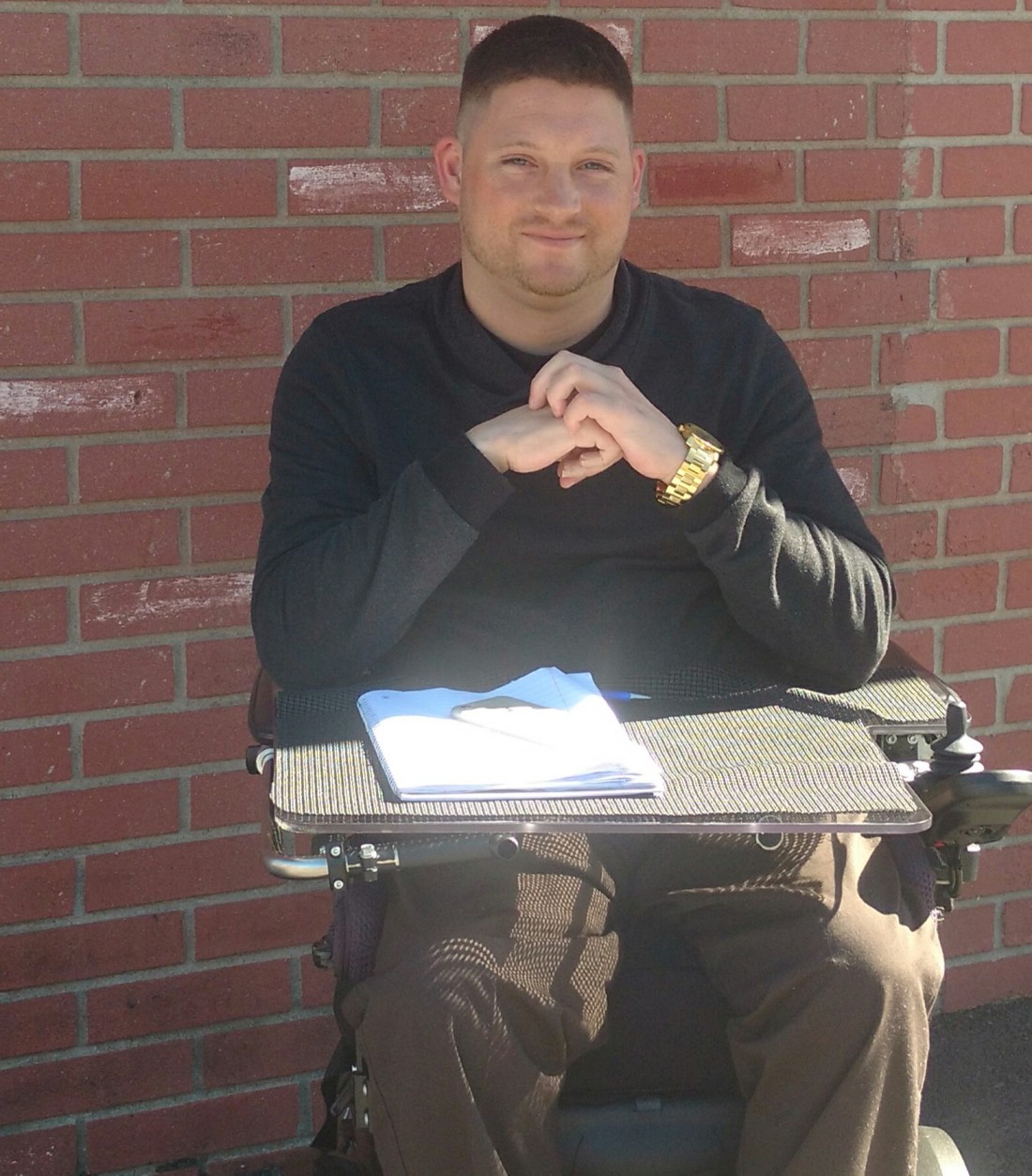“Most of us, if we live long enough, are going to end up with some kind of issue,” says Eva Reynolds, the associate director of DisAbility Partners. Reynolds found that out the hard way, thanks to a 2003 brain injury. A widow with three young children, she was working in a restaurant and had no health insurance. “In those instances, you either sink or swim,” she says.
A self-described champion of the underdog, Reynolds joined DisAbility Partners in 2011 after earning a degree in psychology from UNC Asheville. With locations in Asheville and Sylva, the organization serves 14 Western North Carolina counties, providing information and referrals, training in independent living skills, peer counseling and advocacy. “Our whole purpose is to help people live in the community,” she explains.
The need for such services is great. Nationwide, roughly 56 million people were disabled as of 2010, according to a U.S. Census Bureau report. And a 2012 American Community Survey reported 1.3 million people with disabilities in North Carolina.
In WNC, DisAbility Partners is just one of several local and state organizations that are working to provide needed services. Many committed people, who often have disabilities themselves, are partners in that work, helping build awareness and recognition of the kinds of challenges that no one is immune to.
“Nobody is guaranteed complete mobility,” notes Asheville resident Rylin Mariel, who was diagnosed with multiple sclerosis in 2000. “Disability is something that could happen to anybody.”
Defying the odds
On Jan. 18, 2013, Kiel Baumbach stood on a scaffold, painting shutters. Throughout his 20s, he’d mostly done manual labor: construction in his home state of New York and working for a moving company since relocating to Asheville in 2011.

The painting job was a side gig, and unbeknownst to Baumbach, the scaffold hadn’t been properly assembled, he says. The frame was secured by nails rather than screws, he adds, and as he continued to work, the nails gradually gave way.
“I ended up falling about four stories,” he reveals. “I couldn’t move.”
Baumbach spent the next four weeks in the intensive care unit at Mission Hospital with a broken neck and a shattered forearm; the injury left him paralyzed from his midchest down. Still, he considers himself lucky. The ground was littered with tools and tree stumps that could have made his injuries much worse, and his condition proved to be less severe than the initial prognosis. “In the hospital, they told my family that I wouldn’t be able to talk and I wouldn’t be able to move anything from the neck down,” he says. “I definitely surpassed that.”
The accident, he notes, has opened his eyes to the many local organizations providing assistance. And at a deeper level, his disability has altered his worldview. “When you get an injury of this severity, it really changes the way you look at things,” says Baumbach. “You look at sidewalks to see if they’re accessible, and you kind of learn what businesses are willing to go that extra mile.”
Baumbach now works alongside Reynolds as an independent living specialist at DisAbility Partners. Knowledge, he maintains, is one of the greatest tools he can offer his clients. “We like our consumers to be informed about the Americans with Disabilities Act and how its requirements can benefit us.”
Limits of the law
Passed in 1990, the ADA guarantees individuals with disabilities the same rights and opportunities as other citizens when it comes to things like public accommodations, employment, transportation, telecommunications, and state and local government services.
The Southeast ADA Center in Atlanta is one of 10 such regional facilities across the country. It provides information, training and guidance on the law and conducts research on ways to reduce or eliminate barriers to employment. North Carolina is one of eight states the Atlanta facility serves.
“You may hear some people with older buildings say, ‘I’m grandfathered in,’” says information specialist Rebecca Williams. “But there is no grandfathering in the ADA.”
For some Asheville residents, however, that fact offers little relief. In the late 1970s, Carol Hubbard survived a traumatic brain injury that still affects her mobility today. Title III of the ADA addresses public accommodations and services operated by private entities. But because it’s complaint-driven, it “puts the onus on the people in need of the accommodations to make the change. That’s ass backward as far as I’m concerned,” says Hubbard, who lives in the Battery Park Senior Apartments.
When service providers don’t obey the law, the only options open to an individual are filing a formal complaint or a civil suit, Williams confirms. And since both those avenues are handled at the federal level, local and state governments have no part in the process.
“It’s true,” says Brad Stein, risk manager for the city of Asheville, who recently took on the additional title of ADA coordinator. “We don’t go out and police existing structure. We don’t field complaints from the citizenry regarding ADA compliance or noncompliance on private property. That is not in our purview or mandate.”
But the city, he continues, does review both new construction and renovations to older buildings for ADA compliance. And in the latter case, Stein advises residents to speak with the building owners. “Hopefully most businesses would want to do the right thing … before a citizen would have to file a complaint with the Department of Justice,” he says.
Still, Hubbard points out from her Battery Park apartment, lack of access can lead to extreme isolation. “Think about it: If you don’t know if you can get in somewhere, if you aren’t sure you’ll be able to use the bathroom, how likely are you to take the trouble? It’s easier to just stay home. Out of sight, out of mind: It’s a vicious cycle.”
Mutual benefits
The Arc of North Carolina provides free job placement and retention/support services for people with intellectual and developmental disabilities. And Tim Blekicki, an employment specialist with the Buncombe County chapter, has a fact sheet titled “Five Reasons to Hire Disabled Workers,” which highlights the benefits for employers. For starters, the handout maintains, the disabled community is the nation’s third-largest marketing segment. Nearly 30 percent of the 70 million American families “have at least one family member with a disability,” the fact sheet points out. It also cites a University of Massachusetts poll that found that “87 percent of Americans surveyed said they prefer to patronize businesses that hire people with disabilities.”

Blekicki views employment as a crucial component if we’re to create a more integrated society. Besides providing financial independence, it gives disabled people a place within the greater community. A sense of invisibility, Blekicki and others say, leaves many in the disabled community feeling like second-class citizens.
Christopher Egan, executive director of the N.C. Council on Developmental Disabilities, agrees. The government agency works on behalf of the more than 185,000 people with intellectual or other developmental disabilities in the state. Its 40 members (60 percent of whom either have such disabilities or have a family member who does) are appointed by the governor.
Egan emphasizes the need to highlight success stories. “We want to see employers pulling people in,” he explains, rather than the system “kind of pushing people in.” A 2013 report by the National Governors Association, notes Egan, “highlights Walgreens as a good example. By diversifying their workforce in positions that they typically had a hard time filling and maintaining, they realized there was a positive impact on their business.”
But it’s not just about giving businesses points for inclusivity. The pharmacy chain, says Egan, saw its profits increase. And Blekicki’s handout highlights a common-sense approach, arguing, “When you employ people with disabilities, you’re mirroring the market to attract a wider and more diverse customer base, which can increase your market share.”
Watchdog committee
To help ensure that local folks get the services they need, Blekicki has teamed up with Karen Keating of the Brain Injury Association of North Carolina. Keating, the regional coordinator for the organization’s Asheville office, joined the Mayor’s Committee for Citizens with Disabilities in 2008, after her son sustained a brain injury in a car accident. The committee advised the city on pertinent issues. “Unfortunately, as time went on, it floundered,” she recalls.
Now, however, Blekicki and Keating are working to re-establish the group. “When I got to Asheville, I found the disabled community advocates weren’t networked together,” says Blekicki. “Employment, housing and transportation had their corners, but there was no central network hub. A single phone call should suffice.”
The city, meanwhile, realized that it had a similar problem with respect to issues surrounding Title II of the ADA, which addresses public services at the state and local levels. “What we had been doing was really decentralized,” says Stein. “We wanted to modernize our process. That is, honestly, how I got involved in this.”
As ADA coordinator, Stein is now the single point of contact for city residents with concerns or complaints. They can call his office at 828-259-5687 or reach him via email (bstein@ashevillenc.gov).
Polly McDaniel, a communications specialist for the city, encourages residents to use the Asheville App to report issues or service requests. “It’s an application you can download on your phone; it’s free,” she notes.
Blekicki and Keating hope the new edition of the Mayor’s Committee for Citizens with Disabilities will help the city stay on top of the issues while continuing to advocate for the disabled. “So much progress has been made,” says Blekicki. “But literally, the point of being a progressive is to continue to progress. You never stop learning acronyms; you never get tired of getting better. The second you rest on your laurels, you’re not a progressive anymore.”
Fighting back

It might sound odd, but when Donna Dreyling was diagnosed with reflex sympathetic dystrophy in 2003, she says it felt as though she’d won the lottery.
“It’s a neurological disease where, more or less, the pain receptors never shut off,” she explains. In her case, Dreyling’s “winnings” came in the form of peace of mind: After six years, she could finally identify the source of her joint pains and the discoloration on her hands and feet.
“It can make you very depressed,” she says. “I’ve had to learn to fight to survive.”
In recent years, some of that fighting has been with city residents who violate the law. “My goal is to make this community handicapped-friendly,” she says. In 2014, Dreyling began volunteering with Asheville’s Handicapped Parking Enforcement Program. “I write handicap tickets for the city,” she reveals.
Her biggest gripe — and one she’s written a fair number of tickets for — are nondisabled people who drop passengers off at a store, pull into a disabled parking spot, and wait there until their passengers return. “That will cost you a $250 fine,” she notes.
Often, the recipients of those tickets aren’t happy about it, however, and Dreyling has taken her share of abuse. “People scream at me and yell obscenities,” she says. “The worst violators are the ones who are screaming at me: the violators! And you don’t feel like you have the backup of the police because they have so much other crime to worry about that handicapped parking is bottom of the barrel.”
Come together
Support groups can help ameliorate battle fatigue while fostering a sense of community. In 2015, Ann Karson founded the Asheville chapter of the Hearing Loss Association of America. Between 25 and 50 people typically attend the monthly meetings held at CarePartners on Sweeten Creek Road (for details, visit avl.mx/3hg). “There are people who come and say they value a place where they can expect their hearing loss to be taken into account,” notes Karson. “They can socialize. I think we’re slowly getting appreciated for that.”
The group is also urging local businesses to install hearing loops, which electromagnetically transmit sound to hearing aids and cochlear implants.
Egan of the Council on Developmental Disabilities applauds the chapter’s efforts. “Come together with other people: Your voice is louder that way,” he points out. “Increase advocacy and advocacy development opportunities for members, family members and professions. Train and help people understand that this is how you can make an impact and help shape policy.” And while this strategy doesn’t address individuals’ struggles with exhaustion, he continues, it does create “avenues where we can make change for the future.”
Leading the way
One of those avenues for change is a program called Supported Living — Making the Difference, a statewide effort to help people with intellectual and developmental disabilities achieve increased independence.
Funded by a three-year grant from the Council on Developmental Disabilities, the initiative is led by Vaya Health, an Asheville-based managed care organization. Supported living has been added to the list of government-funded services, and the project will identify and disseminate best practices to be used by care providers.
“The grant is designed to create a statewide learning community,” says Jesse Smathers, Vaya’s network development director. Four partner organizations — Turning Point Services, The Arc of North Carolina, Liberty Corner Enterprises and FIRST — will monitor the progress of 18 people with either intellectual or developmental disabilities as they transition from a group home to living in the community. Vaya, in turn, will monitor the monitors.
“There will be some videography taken from it, and the stories will be shared through a learning community, with quarterly meetings or quarterly webinars,” says Smathers. Consisting of care providers, experts in the field, disability rights activists and other interested parties, the ever-evolving learning community will “help people see the possibilities of using this service,” Smathers notes.
Rachel Leonard-Spencer, Vaya’s marketing and communications coordinator, says, “We want to impress upon people that these individuals aren’t just thrown out there on their own: They do have support.” And drawing on those test cases, Vaya, its partner organizations and additional nonlocal experts will distill best practices to be used in meeting the anticipated increase in demand for such services.
Independent living, notes Smathers, “gives a person pride. It seems to be a part of everyone’s life to break away from the family and move out into the community, get their own place, find a job — all those rights that people without disabilities often take for granted.”
Leonard-Spencer, meanwhile, feels the program can have “a ripple effect that won’t just affect people in the here and now, but possibly for years to come.”
Curse or challenge?
“The first thing I see in the morning, and the last thing I see at night, is that I’m blind,” says Gary Ray. “Everything between those two is either a curse or a challenge.”

Born in Weaverville in 1950, Ray battled poor vision all his life. By the time he enrolled at N.C. State, a strange phenomenon had begun to occur: The varsity athlete thought he saw people jumping in front of his car. But when he returned to Asheville to see his eye doctor, Ray was informed that he had macular degeneration, and by 1980, he was declared legally blind (his vision was 20/200).
For 20 years, Ray worked at the N.C. Library for the Physically Blind and Physically Handicapped in Raleigh. “They paid me to talk,” he says. “I got to go around the state and let blind and visually impaired people know about the services offered.”
After retiring nine years ago, Ray returned to WNC. But Raleigh, he maintains, is way ahead of Asheville when it comes to things like accessibility and transportation services. To help improve conditions here, Ray now serves on the city’s Transit Committee and belongs to the Buncombe County chapter of the National Federation of the Blind. “We believe that with appropriate training and services, a blind person could get blindness down to where it becomes a nuisance, as opposed to something that keeps them at home and never lets them go anywhere,” he explains.
In between his committee work and chapter meetings, though, there are times when Ray feels the full weight of his disability. But he’s taught himself a trick to fend off despair.
“It’s called brainwashing,” he says. “The human brain can generally only keep one line of thought going at any given time. Whenever you feel the curse coming, if you change the way you think — if you change it from curse to challenge, if you force your mind to think ‘challenge’ over and over again — you can start a new day at any point.”




Too bad folks aren’t affirming this great story and news break for local PwDs. There’s more to cover:
http://sustainnc.com/abpwdagenda/
I hope local understand Asheville PwDs are the same population size as Asheville African-Americans. Also Asheville and Buncombe PwDs are experiencing massive risk:
How does North Carolina include Americans with disabilities?
http://sustainnc.com/nc-inclusion-of-americans-disabilities/
Our PwDs are made up of all races, genders, sexual orientations, and creeds.
It’s utter bullshit.
Those of us disabled by crimnal medical neglect who are articulate,know the law,and advocate for ourselves are ignored.
I’m housebound ..because I’ve been denied services.
This thread is indicative of how little folks care.
Council on Aging has but one worker for all elderly disabled.i would not be disabled but for criminal medical neglect.
Disability Partners.told an employee she’d be fired if she talked to me.
I’ve had to resort to reporting the county to federal auditors.
This feel good article is utter hyperbole.
We who could work are denied the right to.
Forget voting or having a social community of support.
I’ve found that only a Civil Rights attorney can address the abuse of our rights.
Eva is the woman who threw me outof disability partner after a decade of begging for help..For pointing out how Mountain Mobility does not adhere to ADA,I lost my temper
Later I found that untreated blood sugar issues due to no access to shopping caused my irritability.
To this day..ive been denied help.
Retaliation for calling the Feds is more truthful
Eva should be fired.
Kathy Harwood is a better director